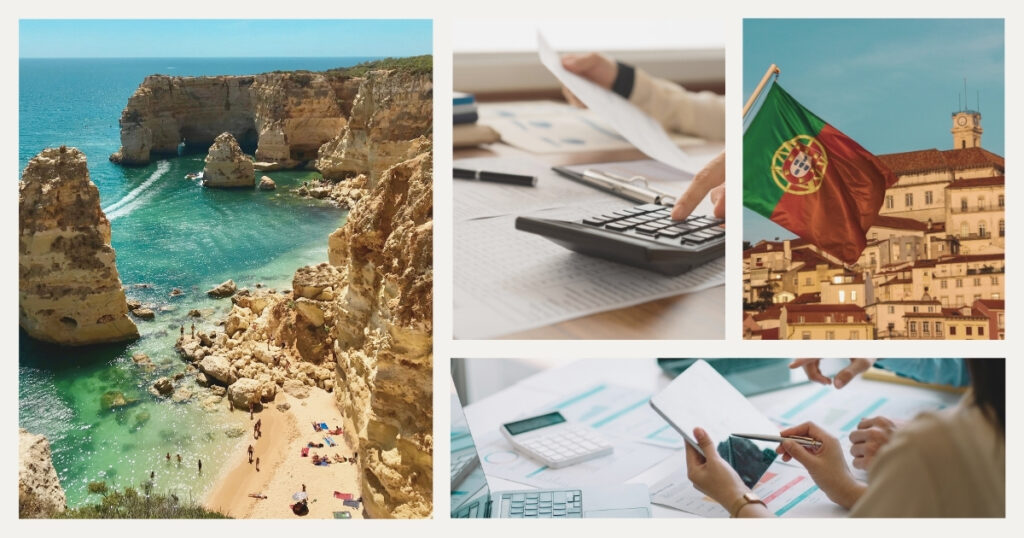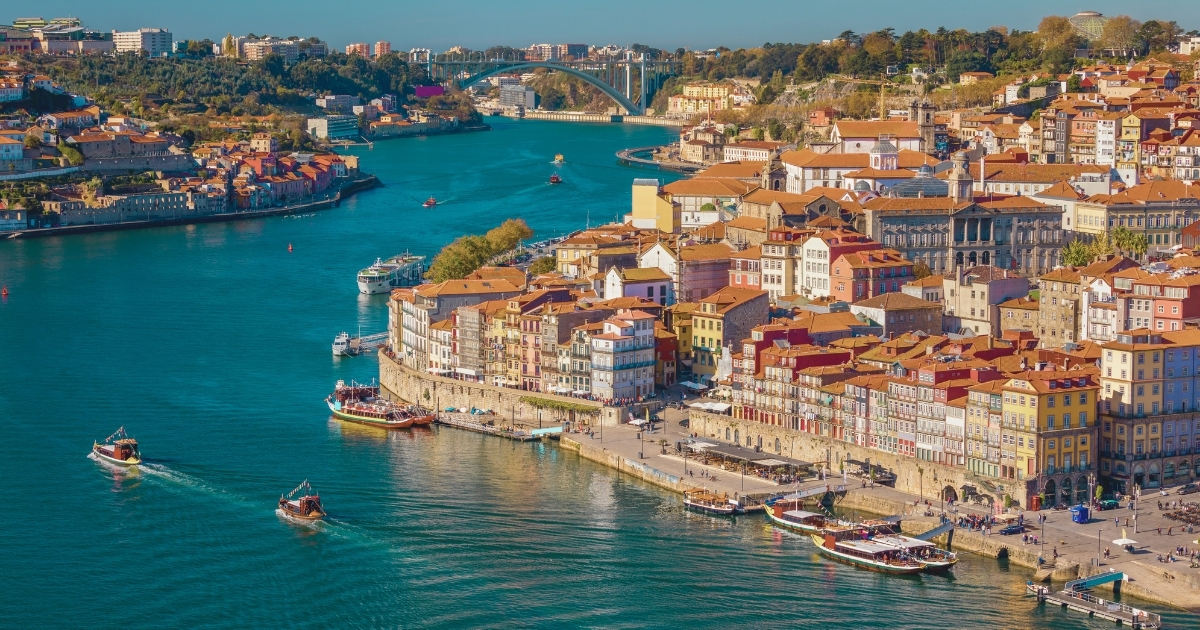Managing taxes in Portugal for foreigners is a crucial step for digital nomads planning to settle in this sunny and vibrant country. Portugal’s tax system is attractive for expats, offering unique benefits like the Non-Habitual Resident (NHR) regime, but it’s important to understand how tax residency, income taxes, and property taxes work.
Whether you’re a freelancer working with global clients or considering buying property, this guide provides everything you need to know to comply with Portuguese tax laws while maximizing the available incentives.
Tax residency in Portugal: how it affects you

Tax residency determines whether you’re taxed on worldwide income or just Portuguese-sourced income. Becoming a tax resident in Portugal has specific implications that you need to understand.
You are considered a tax resident if you spend 183 days or more in Portugal in a calendar year, establish your main residence there, or have significant economic ties to the country, such as running a business or earning income locally. If you meet these criteria, you’ll be taxed on your global income. Non-residents, however, are only taxed on income earned within Portugal.
💡 Pro tip: keep precise records of your days in Portugal and income sources to avoid confusion when filing your taxes.
Key taxes in Portugal for foreigners

Portugal’s tax system is progressive, meaning tax rates increase as your income grows. Understanding these rates is essential for planning your finances.
Income Tax (IRS)
Income tax in Portugal, or Imposto sobre o Rendimento das Pessoas Singulares (IRS), applies to both residents and non-residents. Residents are taxed on their global income, while non-residents pay a flat rate of 25% on Portuguese-sourced income.
For residents, income is taxed at progressive rates ranging from 14.5% to 48%, depending on your earnings. Local and regional taxes may also apply, adding to your overall obligation.
Non-habitual resident (NHR) regime
Portugal’s Non-Habitual Resident (NHR) regime offers significant tax benefits to expats for up to 10 years. Foreign income, such as pensions, dividends, and capital gains, may be exempt from Portuguese taxes, while income from high-value professions in Portugal is taxed at a flat rate of 20%. This makes it a particularly attractive option for digital nomads and freelancers.
💡 Did you know? To qualify for the NHR regime, you must apply within the first year of becoming a Portuguese resident.
How to file your taxes in Portugal as a foreigner?

Filing taxes in Portugal as a foreigner involves a few administrative steps that are important to complete promptly.
Get your NIF
The NIF (Número de Identificação Fiscal) is your tax identification number in Portugal. You’ll need it for nearly all financial and administrative processes, including filing taxes, opening bank accounts, and renting property. This can be obtained from a local Finanças office or through a legal representative.
Submit your annual tax return
Tax returns in Portugal are filed annually between April 1 and June 30 for the previous calendar year. You’ll need to declare all income, including foreign earnings if you’re a resident. Use the Modelo 3 tax form, which allows for deductions and declarations across different income categories.
💡 Pro tip: work with a tax advisor to ensure accuracy and to maximize benefits like the NHR regime or deductible expenses.
Digital infrastructure for Portuguese tax management
Managing taxes in Portugal for foreigners requires understanding the country’s digital tax ecosystem. Portugal has made significant strides in digitalizing its tax services, making online management both necessary and efficient.
Portal das Finanças: your digital tax hub
The Portuguese Tax Authority’s online portal (Portal das Finanças) is central to managing your tax obligations. Digital nomads need reliable internet access to submit declarations, access documents, and communicate with tax authorities.
🌟 Pro tip: stay connected to Portugal’s digital tax services with a Holafly eSIM. Their reliable coverage ensures you never miss important tax deadlines or communications from Finanças, whether you’re in Lisbon or the Algarve.
Authentication and digital certificates
Portugal’s tax system requires specific digital credentials, including the Chave Móvel Digital (Mobile Digital Key) for secure access. Understanding how to obtain and use these digital tools is essential for efficient tax management in Portugal.
💡 Did you know? The Portuguese government’s digital authentication system can be used across multiple public services, making it a valuable tool for managing various aspects of life in Portugal.
Deductions and benefits for digital nomads

Portugal offers a variety of deductions that help reduce your taxable income, particularly for those working as freelancers or remote professionals.
Common deductible expenses
Expenses that directly relate to your work can often be deducted, including:
- Coworking spaces: if you rent a desk at a coworking hub, the costs are deductible.
- Internet and equipment: tools like laptops or software subscriptions are valid deductions.
- Healthcare costs: private health insurance premiums and medical expenses are partially deductible. Learn more in our health insurance guide.
💡 Did you know? Educational expenses, such as professional courses or certifications, can also be deducted if they enhance your skills.
Social security contributions
If you’re self-employed, you’re required to pay social security contributions, calculated at 21.4% of your taxable income. These contributions grant access to Portugal’s healthcare system and other social benefits.
Regional tax benefits and special zones
Portugal offers unique tax advantages in specific regions and zones that digital nomads should consider when choosing their base.
Madeira’s special tax regime
The Madeira International Business Center (MIBC) offers significant tax benefits, including reduced corporate tax rates and potential VAT advantages. Digital nomads establishing businesses in Madeira can benefit from these incentives while enjoying the island’s high quality of life.
Azores and interior regions
The Azores autonomous region applies reduced tax rates, with IRS rates being up to 20% lower than mainland Portugal. Additionally, Portugal’s interior regions offer specific tax benefits to attract remote workers and digital professionals.
Technology hubs and start-up zones
Cities like Porto and Braga are emerging as technology hubs, offering additional incentives for digital businesses. These include reduced rates for certain types of income and special deductions for innovation-related expenses.
🌟 Pro tip: research regional incentives before choosing your base in Portugal. Some areas offer significant tax advantages alongside lower living costs.
Property taxes in Portugal

If you own property in Portugal, additional taxes apply. The IMI (Imposto Municipal sobre Imóveis) is an annual municipal property tax based on the property’s value. Rates range from 0.3% to 0.8%, depending on the location.
If you rent out property, rental income is taxed at 28% for non-residents and progressive rates for residents. Selling property may result in capital gains tax, applied at 28% for non-residents or progressive rates for residents. Proper planning and record-keeping are essential to managing these obligations.
💡 Pro tip: some property renovations may qualify for tax incentives, so check with local authorities before starting a project.
Avoiding double taxation
Portugal has tax treaties with numerous countries to prevent double taxation, ensuring you’re not taxed twice on the same income. For example, under the Portugal-USA tax treaty, American citizens can offset taxes paid in Portugal against their U.S. obligations.
Understanding how to apply these treaties effectively requires careful documentation and planning. Each treaty has specific provisions that determine which country has primary taxing rights over different types of income. For instance, income from remote work might be treated differently than rental income or investment dividends. It’s crucial to maintain detailed records of where your income is sourced and any taxes already paid in other jurisdictions. Many digital nomads find it helpful to work with tax advisors who specialize in international taxation and are familiar with Portugal’s extensive network of tax treaties to ensure they’re taking full advantage of available exemptions and credits.
💡 Did you know? Even if your income is taxed elsewhere, you must declare it in Portugal if you’re a resident. Failing to do so can result in penalties.
Ready to manage your taxes in Portugal like a pro?
Managing taxes in Portugal as a foreigner may seem complex at first, but with the right information and support, it becomes much more straightforward. By staying informed and proactive, you can handle your finances with confidence and spend more time enjoying everything Portugal has to offer.
🌍 Take control today! Visit Nomada for expert advice, or explore our Portugal-specific resources to make your journey seamless.
Frequently asked questions about taxes in Portugal for foreigners
If you stay less than 183 days and don’t establish residency, you’ll only pay taxes on income earned within Portugal. However, it’s important to understand that other factors beyond the 183-day rule can establish tax residency, such as maintaining a permanent home or having your primary center of business interests in Portugal.
The Non-Habitual Resident regime is a special tax program offering significant benefits for up to 10 years. You can apply within your first year of becoming a tax resident in Portugal. The regime provides tax exemptions on most foreign-source income and a flat 20% rate on Portuguese-sourced income from high-value activities. Application requires careful timing and proper documentation through the tax authorities.
Yes, expenses like coworking spaces, equipment, and internet costs are deductible if they directly relate to your work. To qualify, you must maintain proper documentation, including invoices and proof of payment. It’s important to understand which category of expenses these fall under in your tax declaration and maintain records for at least four years.
The Azores and Madeira have special tax regimes with potentially lower rates than mainland Portugal. If you establish residency in these regions, you might benefit from reduced IRS rates and additional tax incentives. However, you must meet specific residency requirements to qualify for these regional benefits.
You’ll need access to Portal das Finanças and a Chave Móvel Digital for secure authentication. Having a Portuguese phone number is also crucial for receiving authentication codes and official communications. Many digital nomads find that having both a NIF and digital authentication credentials before arrival helps streamline the process.
Yes, Portugal’s tax system is highly digitalized. Through Portal das Finanças, you can submit declarations, pay taxes, access documents, and communicate with tax authorities. However, some initial procedures, like obtaining your NIF or applying for the NHR regime, may require in-person visits or representation.




